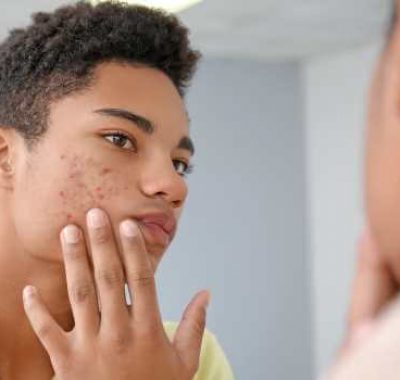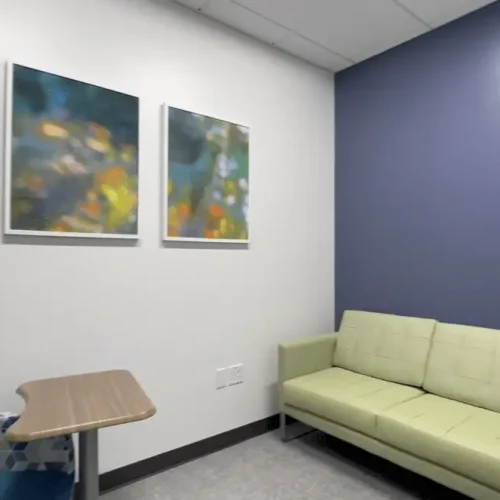Teen Body Dysmorphic Disorder (BDD) Treatment, Counseling, and Therapy Program in Dallas, Texas
Is your child struggling with obsessive body image thoughts and distorted body perception? Call BasePoint Academy to schedule a free assessment and learn more about teen body dysmorphic disorder treatment in Dallas, Texas. Our holistic treatment centers address the whole person through expertise in adolescent development and evidence-based practices.
Our rehabilitation centers in Arlington, Forney, and McKinney specialize in treating a range of psychiatric conditions, including teen Body Dysmorphic Disorder (BDD). Our outpatient treatment centers’ teams of specialists address mental health and body image issues with compassion and efficacy. This page will answer common questions about this condition affecting about 1.9% of adolescents.
What Is Teen Body Dysmorphic Disorder (BDD)?
Teen Body Dysmorphic Disorder (BDD), also known as dysmorphophobia, is a body image disorder where teens fixate on perceived physical flaws that are often unnoticeable to others. This obsession can lead to compulsive mirror checking, appearance-related anxiety, excessive grooming behavior, fear of judgment about appearance, and self-esteem issues tied to body image.
Body dysmorphic disorder in teens often stems from a mix of genetic, environmental, and psychological factors. A family history of anxiety or obsessive-compulsive tendencies can increase susceptibility. Social pressures, including unrealistic beauty standards promoted by media and peers, often amplify concerns about appearance. Negative experiences such as bullying or teasing about physical traits can also deeply affect a teen’s self-image.
Imbalances in brain chemicals like serotonin are believed to play a role in BDD, influencing how teens perceive themselves. These imbalances can intensify obsessive thinking patterns, making it difficult for teens to view their appearance objectively.
The DSM-5 categorizes BDD under “obsessive-compulsive and related disorders” alongside OCD and other related conditions. Unfortunately, body dysmorphic disorder is often misdiagnosed as several other conditions, including Major Depressive Disorder (MDD) and OCD itself. Understanding BDD’s nuances and seeking professional support is vital to a proper diagnosis and treatment.
Insurance Coverage for Teen Body Dysmorphic Disorder
Our complimentary assessment with a licensed clinician will recommend the appropriate level of care for your teen struggling with body dysmorphic disorder. We can also check your insurance coverage levels.
Call us today to schedule a complimentary same-day assessment at (972) 357-1749 or complete our inquiry form.
Teen Body Dysmorphic Disorder Treatment Admissions
Contact BasePoint Academy Today
Contact us today to schedule a free confidential assessment for your teen with a licensed clinician.
You can also get in touch to talk with our mental health experts about treatment needs, care options and your insurance coverage levels.
Call: (972) 357-1749Check Your InsuranceTeen Body Dysmorphic Disorder Symptoms and Signs
Recognizing teen body dysmorphic disorder symptoms is essential for understanding how it impacts your child. Teens with this condition often struggle with obsessions about their physical appearance, focusing on minor or imagined flaws. This emotional distress over appearance can interfere with daily life, relationships, and mental well-being.
Look for these behaviors that may indicate teen Body Dysmorphic Disorder (BDD):
- Skin picking due to body image: Teens may pick at their skin obsessively, trying to “fix” perceived imperfections like acne or scars.
- Social anxiety and body dysmorphia: Fear of being judged for their appearance may lead to avoiding social events, school, or activities they once enjoyed.
- Plastic surgery obsession: Teens may express a fixation on changing specific features through cosmetic surgery, often believing it’s the only way to improve their self-esteem.
- Compulsive actions: Spending excessive time in front of the mirror or grooming to address perceived flaws.
- Emotional distress over appearance: Persistent feelings of shame, sadness, or frustration about their looks.
- Self-esteem issues and body image: A negative self-image may cause your teen to feel unworthy or unattractive, leading to withdrawal from friends and family.

If your teen frequently talks about cosmetic surgery and BDD, engages in compulsive mirror checking, or their obsessions with physical appearance dominate their thoughts and actions, it’s time to seek teen body dysmorphic disorder help. Early awareness and intervention can make a significant difference in addressing these challenges and supporting your teen’s emotional health.
Statistics on Adolescent Body Dysmorphic Disorder in Texas
Body Dysmorphic Disorder (BDD) affects about 1.9% of adolescents, with girls being six times more likely to be affected than boys. While BDD typically begins in early adolescence, it can also develop during childhood, and its symptoms in teens and children closely resemble those in adults.
Research shows that BDD is often accompanied by other mental health issues, with major depression being the most common. Anxiety disorders, including social anxiety, are also common, with over 60% of individuals with BDD affected. Effective teen body dysmorphic disorder treatments include Cognitive Behavioral Therapy (CBT). CBT has been proven in clinical trials to reduce teen body dysmorphic disorder symptoms.
Do Teen Mental Health Programs Provide Therapy and Treatment for BDD?
Yes, teen mental health programs often provide therapy and treatment for Body Dysmorphic Disorder (BDD). These programs offer specialized teen body dysmorphic disorder treatments, including psychotherapy like cognitive behavioral therapy for BDD. This evidence-based approach helps teens identify and challenge distorted thoughts about their appearance.
Many mental health treatment centers offer psychotherapy, group therapy, skill-building activities, and family counseling. These resources foster emotional resilience and offer a supportive environment for teens struggling with BDD. By addressing the root causes of body dissatisfaction, these programs empower teens to develop healthier perspectives.
Seeking professional help can make a meaningful difference. A teen healthcare facility like BasePoint Academy can create a safe space for teens to explore their feelings, improve their self-image, and build coping skills. Contact us today.
What Types of Teen Body Dysmorphic Disorder Therapy and Treatment Programs Are Available in Dallas, Texas?
Effective therapy for teen body dysmorphic disorder in Dallas, Texas, can be delivered in various programs. For example, day treatment programs at a behavioral health center provide intensive support while allowing teens to maintain daily routines. Below is an overview of a few of the programs ideal for treating teen body dysmorphic disorder. This isn’t a complete list.
Partial Hospitalization Program (PHP) and Day Treatment
Partial Hospitalization Programs (PHPs) and day treatment options offer structured, intensive body dysmorphia treatment for teens dealing with related and complex mental health challenges. These programs provide a higher level of support than traditional outpatient care. PHPs assist teens with building coping skills while returning home in the evenings to implement what they’ve learned.
At a medical treatment center, PHP and day treatment programs often include individual therapy, group sessions, and psychiatric support tailored to each teen’s needs. These comprehensive approaches address emotional and behavioral struggles while promoting long-term healing and resilience.
Outpatient and Evening Treatment Programs
Outpatient and evening treatment programs offer more flexible care for teens needing support with mental health challenges like body dysmorphic disorder. Often provided at a therapy clinic or wellness center, these programs allow teens to attend sessions around their school or family schedules, making treatment more accessible.
These programs combine individual therapy, group counseling, and skill-building exercises to help teens address underlying issues and develop healthier coping mechanisms. Evening programs can especially benefit families seeking convenient, effective care tailored to their teens’ needs.
Intensive Outpatient Program (IOP)
IOPs provide a focused yet flexible approach to treating mental health concerns like body dysmorphic disorder. Often available at integrative treatment centers, like BasePoint Academy, IOPs offer psychotherapy for body dysmorphic disorder several times weekly while allowing teens to continue their daily activities at home or school. An IOP can help teens develop healthier self-perceptions and improve overall mental well-being.
Inpatient and Residential Treatment
Inpatient treatment centers provide 24/7 care for teens facing severe mental health challenges related to Body Dysmorphic Disorder (BDD). These programs offer a safe, structured environment where teens can solely focus on intensive therapy and support without the distractions of daily life.
A residential treatment facility that specializes in treatment for body dissatisfaction provides comprehensive, personalized, and evidence-based care. Teens benefit from individual psychotherapy, group counseling, and activities designed to build self-esteem and emotional resilience, fostering long-term recovery in a nurturing setting.
What Types of Counseling and Therapy Programs for Teen Body Dysmorphic Disorder Are Available Near Me?

If you’re looking for counseling and therapy programs for teen Body Dysmorphic Disorder (BDD) near you, there are several options to consider. Psychotherapy for body dysmorphic disorder helps teens address the emotional distress caused by BDD and improve their self-esteem. Below are examples of available programs, though this list is not exhaustive.
Mindfulness-Based and Acceptance and Commitment Therapy (ACT)
Mindfulness-based therapy and ACT are effective approaches for addressing teen body dysmorphic disorder symptoms, such as anxiety, depression, and stress. In mindfulness-based therapy, your teen will learn to stay present and accept thoughts without judgment, reducing their power. ACT encourages teens to align their actions with values, even under challenging emotions.
These therapies build resilience, improve emotional regulation, and develop a healthier mindset by focusing on living with intention and self-compassion.
Dialectical Behavior Therapy (DBT) and Psychodynamic Therapy
DBT and psychodynamic therapy are both valuable tools for addressing BDD in teens. DBT helps them manage intense emotions and develop healthier coping strategies, focusing on balancing acceptance with change. It teaches skills for emotional regulation, mindfulness, and interpersonal effectiveness, which are crucial when struggling with self-esteem issues and body image.
Psychodynamic therapy explores the deeper, unconscious factors influencing thoughts and behaviors around body image. Understanding past experiences and how they shape present feelings helps teens build a stronger sense of self-worth and healthier perceptions of their bodies.
Trauma-Informed Therapy
Trauma-informed therapy helps your teen understand how past traumatic experiences may be influencing their thoughts, feelings, and behaviors, especially when it comes to this body image disorder. A therapist provides a safe, supportive environment where your teen can explore and heal from trauma at their own pace.
By recognizing the effects of trauma, this psychotherapy for body dysmorphic disorder helps your teen develop healthier coping strategies, regain a sense of control, and work through emotional pain.
Group and Family Therapy
Group and family therapy are incredibly beneficial for addressing teen body dysmorphic disorder symptoms. In group therapy, your teen will connect with others facing similar challenges, offering a sense of shared experience and support. This setting encourages open communication, emotional validation, and the development of coping strategies.
Family therapy focuses on strengthening the support system at home, helping everyone understand BDD, and improving communication. It’s a way to create a united approach to your teen’s treatment, fostering healing and a deeper understanding within the family unit.
Art and Music Therapy
Art and music therapy provide creative outlets for your teen to express emotions that may be difficult to put into words, especially when struggling with body dysmorphic disorder. These therapies offer a safe space to explore feelings through art or music, helping teens process their experiences and reduce emotional distress.
Engaging in these forms of expression can also boost self-esteem, encourage self-discovery, and provide a sense of accomplishment, all of which are important in the healing process.
Cognitive Behavioral Therapy (CBT) and Exposure and Response Prevention (ERP)
CBT and ERP are effective teen body dysmorphic disorder treatments. CBT focuses on identifying and challenging negative thought patterns involving appearance-related anxiety, replacing them with healthier, more realistic perspectives. ERP gradually exposes your teen to situations that exacerbate body-related anxieties, helping them resist the urge to engage in harmful behaviors, like compulsive mirror checking or excessive grooming behavior.
BasePoint Academy Accepts health Insurance
We accept most major health insurance providers in Texas and can check your treatment coverage levels on your behalf.
How to Find Body Dysmorphic Disorder Treatment Facilities Near Me
At BasePoint Academy, we have multiple recovery centers located in and around Dallas, Texas, specializing in addressing symptoms of teen body dysmorphic disorder. Our rehabilitation centers provide exceptional treatment programs tailored to the unique needs of adolescents, ensuring the necessary care and support. We pride ourselves on improving the mental health and well-being of Texas youth. Call us at (972) 357-1749 for a free body dysmorphic disorder assessment.
- Arlington, Texas: 3900 Arlington Highlands Blvd, Suite 237, Arlington, TX 76018
- Forney, Texas: 713 W Broad St, Suite 200, Forney, TX 75126
- Frisco, Texas: 8275 Judges Way, Suite 100I, Frisco, TX 75036
- McKinney, Texas: 4733 Medical Center Drive, McKinney, TX 75069

Teen BDD Treatment Program in Arlington, Texas
Located midway between Dallas and Fort Worth, Arlington, Texas, offers a dynamic blend of commerce, education, and entertainment. With notable landmarks such as the University of Texas at Arlington, the Dallas Cowboys, and Six Flags, the city provides a wealth of activities. Teens struggling with body dysmorphic disorder can also access targeted treatment programs in this thriving metropolitan area.
- BasePoint Academy – Arlington, Texas: 3900 Arlington Highlands Blvd, Suite 237, Arlington, TX 76018, United States
Teen BDD Treatment Program in Forney, Texas
About twenty miles east of Dallas in Kaufman County, Forney, Texas, combines the charm of a small town with modern amenities. As part of the Dallas–Fort Worth Metroplex, it offers a supportive community for families focused on mental health. Families like yours can find specialized treatment programs to enhance your teen’s emotional well-being while building stronger social ties.
- BasePoint Academy – Forney, Texas: 713 W Broad St, Suite 200, Forney, TX 75126, United States
Teen BDD Treatment Program in McKinney, Texas
About thirty miles north of Dallas in Collin County, McKinney is a thriving city known for its strong sense of community and inviting atmosphere. As a vital part of the Dallas–Fort Worth Metroplex, McKinney offers families access to top-tier mental health resources. Teens struggling with body dysmorphic disorder can receive personalized care promoting emotional stability and improved social skills.
- BasePoint Academy – McKinney, Texas: 4733 Medical Center Drive, McKinney, TX 75069, United States
Alternative Ways to Find BDD Treatment Options Near Me
Finding the right treatment for teen Body Dysmorphic Disorder (BDD) doesn’t have to be overwhelming. You can connect your teen with effective care by taking a few key steps. Start by using Google or another search engine and input key phrases like “Teen body dysmorphic disorder treatment in Dallas, TX” or “adolescent psychotherapy for body dysmorphic disorder near me.”
Ensure the centers you consider specialize in adolescent care, are accredited, and are staffed with licensed professionals. For example, BasePoint Academy is accredited by respected organizations such as The Joint Commission, demonstrating our commitment to providing ethical, high-quality care to adolescents (11-18). Accreditation guarantees your teen will receive treatment in a safe, professional setting.
Look into the available treatment options, including outpatient or day treatment programs. If your teen has co-occurring disorders, consider dual diagnosis treatment centers that simultaneously address both conditions. Ensure evidence-based therapies like Cognitive Behavioral Therapy (CBT) are included in the treatment approach. Review your insurance benefits to understand potential costs and consider visiting treatment centers to assess their resources and environment. For feedback, you can also check mental health directories and trusted review sites like Yelp and the Better Business Bureau.
If you’re unsure where to start, contact BasePoint Academy. We’re connected to a network of treatment providers across Texas and can help guide you to the best care for your teen. We also offer a free assessment to support your decision-making process.
What Is the BasePoint Difference?

7am to 7pm CST
7 Days a Week

Full Time Physican
On Site

We Transport
To and From

Therapy Involving
the Whole Family

Family
Owned

Contact BasePoint Academy Today
Contact us today to schedule a free confidential assessment for your teen with a licensed clinician.
You can also get in touch to talk with our mental health experts about treatment needs, care options and your insurance coverage levels.
Call: (972) 357-1749Check Your InsuranceDoes Health Insurance Cover Teen Body Dysmorphic Disorder Treatment and Therapy Programs in Dallas, Texas?
Yes, many health insurance plans cover teen body dysmorphic disorder treatment in Dallas, Texas. It’s important to check your insurance benefits to find out if your plan provides coverage. Coverage may include therapy sessions, medication management, and other treatment services that address the specific needs of adolescents struggling with body dysmorphic disorder.
It’s a good idea to contact your insurer or a specialty treatment center like BasePoint Academy. We can confirm your insurance benefits and provide details on the services covered and any out-of-pocket costs you may incur. We’re dedicated to making accessing necessary care for your teen easier.

How Much Does BDD Treatment for Teens and Adolescents Cost Without Health Insurance Coverage?
The cost of Body Dysmorphic Disorder (BDD) treatment for teens and adolescents without health insurance coverage can vary widely. Individual psychotherapy sessions typically range from $100 to $250 per session, depending on the treatment center and type of therapy. Costs may increase if your teen requires intensive treatment or additional services like family therapy or group sessions.
To get an accurate estimate, contact BasePoint Academy and inquire about our pricing structure. We can provide specific details about your teen’s treatment needs and discuss how we can make the necessary care more affordable.
How Much Does BDD Therapy for 11 to 18-Year-Olds Cost with Health Insurance Coverage?
Body dysmorphic disorder therapy expenses for 11 to 18-year-olds with health insurance coverage depend on your specific plan. Copayments average between $20 to $60 per therapy session. Your out-of-pocket expenses may include deductibles and coinsurance, as well. It’s essential to use an in-network provider to maximize your benefits.
To better understand the cost, contact BasePoint Academy at (972) 357-1749 to verify coverage details. We work closely with many insurers and can provide the necessary information so you can access care for your teen with clarity and confidence.
Contact BasePoint Academy Today
Contact us today to schedule a free confidential assessment for your teen with a licensed clinician.
You can also get in touch to talk with our mental health experts about treatment needs, care options and your insurance coverage levels.
Call: (972) 357-1749Check Your InsuranceWhat Is the Admissions Process for BDD Therapy and Treatment at BasePoint Academy?
The admissions process for teen body dysmorphic disorder treatment in Dallas, Texas, at BasePoint Academy, guides your family through each step while ensuring your teen receives personalized, compassionate care. This comprehensive process focuses on helping your teen build healthier coping strategies and a positive self-image. Here’s a general overview of admissions at BasePoint Academy:
- Initial Contact: Start by reaching out to BasePoint Academy. Our admissions team will answer your questions and collect basic information about your teen’s BDD challenges.
- Intake Assessment: Your teen will undergo a thorough intake assessment by licensed professionals. This helps identify their specific needs and any underlying factors or co-occurring disorders contributing to BDD.
- Evaluation and Diagnosis: A formal diagnosis is made following the assessment and more extensive evaluation.
- Personalized Treatment Plan Development: We collaborate with you and your teen to create a treatment plan tailored to their unique needs, with clear goals and structured therapy approaches.
- Insurance Verification and Financial Counseling: We confirm insurance coverage details and offer financial counseling to clarify out-of-pocket expenses, ensuring transparency.
- Admission Approval: Once all steps are completed, we confirm your teen’s acceptance into the program and schedule their start date.
- Family Orientation: You and your teen will participate in an orientation to understand your role in the treatment process and how to support their progress.
- Admittance to the Program: Your teen will officially begin treatment, including therapy sessions, skill-building workshops, and group activities.
- Ongoing Monitoring and Adjustments: Throughout the program, our specialists monitor your teen’s progress and adjust the treatment plan to meet their evolving needs.
What Happens at a Teen Body Dysmorphic Disorder Treatment Center?
At a teen body dysmorphic disorder mental health treatment center, your teen will receive specialized, holistic care that addresses the emotional and behavioral aspects of this body image disorder. Treatment typically involves a combination of individual therapy, group therapy, and family support, all aimed at helping your teen challenge distorted body perceptions and develop healthier coping skills.
Therapy modalities like Cognitive Behavioral Therapy (CBT) are often used to help them identify and change negative thought patterns while gradually reducing harmful behaviors such as compulsive mirror checking or excessive grooming. In addition to therapy, your teen may participate in skills-building activities that promote emotional regulation and improve self-esteem. Treatment centers also focus on creating a supportive environment where your teen can connect with peers facing similar struggles, which helps reduce isolation. Throughout the process, the team works closely with your family to ensure everyone is involved in supporting your teen’s healing and growth.

Contact The BasePoint Academy Today!
Does your teen display signs and symptoms of body dysmorphic disorder? If you are concerned about your teenager’s mental health, contact BasePoint Academy for an assessment and treatment recommendations for your teen.
Sources
- World Health Organization. (n.d.). Mental health of adolescents. World Health Organization. Retrieved from https://www.who.int/news-room/fact-sheets/detail/adolescent-mental-health on July 11, 2023
- Horowitz, J. M. (2019, February 20). Most U.S. teens see anxiety and depression as a major problem among their peers. Pew Research Center’s Social & Demographic Trends Project. Retrieved from https://www.pewresearch.org/social-trends/2019/02/20/most-u-s-teens-see-anxiety-and-depression-as-a-major-problem-among-their-peers/ on July 11, 2023
Statistics on Teen Body Dysmorphic Disorder for Texas Families
- Body Dysmorphic Disorder (BDD) affects about 1.9% of adolescents, according to the Journal of the American Academy of Child & Adolescent Psychiatry.
- According to U.S. News and World Report, body dysmorphic disorder is six times more prevalent in girls than boys, impacting about 1.8% of girls compared to only 0.3% of boys.
- Body dysmorphic disorder typically starts in early adolescence, though it can also develop during childhood. While there isn’t much research on this condition in this demographic, the signs and symptoms in children and teens seem similar to those in adults.
- Research in the journal Comprehensive Psychiatry shows that major depression is the most common disorder found alongside Body Dysmorphic Disorder (BDD). It found that 58% of people with BDD currently had depression, and 76% experienced it at some point in their lives. In most cases, depression developed after BDD, supporting the idea that depression is often a secondary issue. Other common co-occurring disorders alongside BDD include substance use disorders, social anxiety, OCD, and personality disorders, particularly avoidant personality disorder.
- Studies have found that more than 60% of individuals with BDD have experienced an anxiety disorder at some point in their lives, with 38% specifically dealing with social anxiety disorder.
- Cognitive behavioral therapy for BDD is the first-line treatment. Several clinical trials have shown that cognitive behavioral therapy is effective in treating body dysmorphic disorder.
- Medications, particularly Selective Serotonin Reuptake Inhibitors (SSRIs), have been found to help reduce teen body dysmorphic disorder symptoms. These medications are most effective when used alongside cognitive behavioral therapy.







